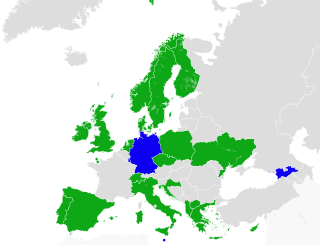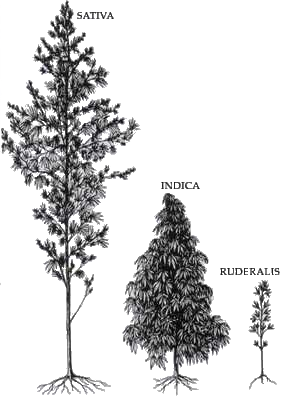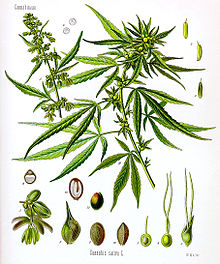
Medical cannabis, medicinal cannabis or medical marijuana (MMJ), refers to cannabis products and cannabinoid molecules that are prescribed by physicians for their patients. The use of cannabis as medicine has a long history, but has not been as rigorously tested as other medicinal plants due to legal and governmental restrictions, resulting in limited clinical research to define the safety and efficacy of using cannabis to treat diseases.

Cannabidiol (CBD) is a phytocannabinoid, one of 113 identified cannabinoids in cannabis plants, along with tetrahydrocannabinol (THC), and accounts for up to 40% of the plant's extract. Medically, it is an anticonvulsant used to treat multiple forms of epilepsy. It was discovered in 1940 and, as of 2022, clinical research on CBD included studies related to the treatment of anxiety, addiction, psychosis, movement disorders, and pain, but there is insufficient high-quality evidence that CBD is effective for these conditions. CBD is sold as an herbal dietary supplement and promoted with yet unproven claims of particular therapeutic effects.
Jon B. Gettman is a marijuana rights activist, a leader of the Coalition for Rescheduling Cannabis, and a former head of the National Organization for the Reform of Marijuana Laws. He has a PhD in public policy and regional economic development from George Mason University and is a longtime contributor to High Times magazine. Gettman filed a petition in 1995 to remove cannabis from Schedule I of the Controlled Substances Act that was eventually denied. A second petition was filed in 2002, with the Coalition for Rescheduling Cannabis, that remains under review by the Department of Health and Human Services. Gettman frequently publishes on the marijuana industry and is an associate professor of Criminology and Criminal Justice at Shenandoah University in Virginia.

In the United States, the removal of cannabis from Schedule I of the Controlled Substances Act, the category reserved for drugs that have "no currently accepted medical use", is a proposed legal and administrative change in cannabis-related law at the federal level. After being proposed repeatedly since 1972, the U.S. Department of Justice initiated 2024 rulemaking to reschedule cannabis to Schedule III of the Controlled Substances Act. The majority of 2024 public comments supported descheduling, decriminalizing, or legalizing marijuana at the federal level.

Cannabis, commonly known as marijuana, weed, and pot, among other names, is a non-chemically uniform drug from the cannabis plant. Native to Central or South Asia, the cannabis plant has been used as a drug for both recreational and entheogenic purposes and in various traditional medicines for centuries. Tetrahydrocannabinol (THC) is the main psychoactive component of cannabis, which is one of the 483 known compounds in the plant, including at least 65 other cannabinoids, such as cannabidiol (CBD). Cannabis can be used by smoking, vaporizing, within food, or as an extract.

THC-O-acetate is the acetate ester of THC. The term THC-O-acetate and its variations are commonly used for two types of the substance, dependent on which cannabinoid it is synthesized from. The difference between Δ8-THC and Δ9-THC is bond placement on the cyclohexene ring.

In the United States, increased restrictions and labeling of cannabis as a poison began in many states from 1906 onward, and outright prohibitions began in the 1920s. By the mid-1930s cannabis was regulated as a drug in every state, including 35 states that adopted the Uniform State Narcotic Drug Act. The first national regulation was the Marihuana Tax Act of 1937.

Marijuana, or marihuana, is a name for the cannabis plant, and more specifically, a drug preparation from it. "Marijuana" as a term varies in usage, definition and legal application around the world. Some jurisdictions define "marijuana" as the whole cannabis plant or any part of it, while others refer to "marijuana" as a portion of the cannabis plant that contains high levels of tetrahydrocannabinol (THC). Some jurisdictions recognize "marijuana" as a distinctive strain of cannabis, the other being hemp. For legal, research and statistical reference, "marijuana" generally refers to only the dried leaves and flowering tops, with by-products such as hashish or hash oil being uniquely defined and regulated. The form "marihuana" is first attested in Mexican Spanish; it then spread to other varieties of Spanish and to English, French, and other languages.

The use, sale, and possession of cannabis containing over 0.3% THC by dry weight in the United States, despite laws in many states permitting it under various circumstances, is illegal under federal law. As a Schedule I drug under the federal Controlled Substances Act (CSA) of 1970, cannabis containing over 0.3% THC by dry weight is considered to have "no accepted medical use" and a high potential for abuse and physical or psychological dependence. Cannabis use is illegal for any reason, with the exception of FDA-approved research programs. However, individual states have enacted legislation permitting exemptions for various uses, including medical, industrial, and recreational use.
Doctors for Drug Policy Reform, or D4DPR is a 501(c)(3) non-profit organization that serves as a global voice for licensed health professionals and scientists advocating for evidence-based drug policies and best practices that advance public health, reduce stigma, and minimize harm. D4DPR leverage the expertise, compassion, and influence of licensed health professionals to enact changes in drug policy necessary to improve public health, human rights, social justice, and consumer protections. D4DPR, formerly DFCR, was founded in 2015 by David L. Nathan. In 2021, Dr. Bryon Adinoff, an addictionologist, researcher, and editor-in-chief of the American Journal of Drug and Alcohol Abuse succeeded Nathan to become D4DPR's second president.

Cannabis is currently legal for medical and industrial uses in Italy, although it is strictly regulated, while it is decriminalized for recreational uses. In particular, the possession of small amounts of marijuana for personal use is a civil infraction. The possible sanctions for possession vary from the issuing of a diffida to first offenders, which is an injunction not to use the drug again; to the temporary suspension of certain personal documents for repeat offenders. Conversely, the unauthorized sale of cannabis-related products is illegal and punishable with imprisonment, as is the unlicensed cultivation of cannabis, although recent court cases have effectively established the legality of cultivating small amounts of cannabis for exclusively personal use. The licensed cultivation of cannabis for medical and industrial purposes requires the use of certified seeds; however, there is no need for authorization to plant certified seeds with minimal levels of psychoactive compounds.

Cannabis has been cultivated in Japan since the Jōmon period of Japanese prehistory approximately six to ten thousand years ago. As one of the earliest cultivated plants in Japan, cannabis hemp was an important source of plant fiber used to produce clothing, cordage, and items for Shinto rituals, among numerous other uses. Hemp remained ubiquitous for its fabric and as a foodstuff for much of Japanese history, before cotton emerged as the country's primary fiber crop amid industrialization during the Meiji period. Following the conclusion of the Second World War and subsequent occupation of Japan, a prohibition on cannabis possession and production was enacted with the passing of the Cannabis Control Law.
The list includes and details significant events that occurred in the global history of national-level implementations of, or changes made to, laws surrounding the use, sale, or production of the psychoactive drug cannabis.
The Donald Trump administration took positions against marijuana and against the easing of laws regarding marijuana. Although Trump indicated during his 2016 presidential campaign that he favored leaving the issue of legalization of marijuana to the states, his administration subsequently upheld the federal prohibition of cannabis, and Trump's 2021 fiscal budget proposal included removing protections for state medical marijuana laws.

Terms related to cannabis include:
The status of Cannabis in international law refers to the series of dispositions in international law affecting States' sovereignty in relation to the Cannabis plant genus, to a variety of "cannabis products" derived from the plant, or to their synthetic analogs.

The following outline is provided as an overview of and topical guide to the plant Cannabis sativa and its relatives Cannabis indica and Cannabis ruderalis, the drug cannabis (drug) and the industrial product hemp.
Hemp Industries Association v. Drug Enforcement Administration, often shortened to HIA v. DEA, refers to two lawsuits concerning the legality of cannabis extracts and other products from the hemp plant that have very low or nonexistent natural THC levels, including CBD oil, in the United States. The first is from 2004 and the second is from 2018.
Cannabis legislation proposals are legislative proposals which failed to make it into law. Below are lists, broken down into national jurisdictions, of proposed legislation regarding cannabis.









